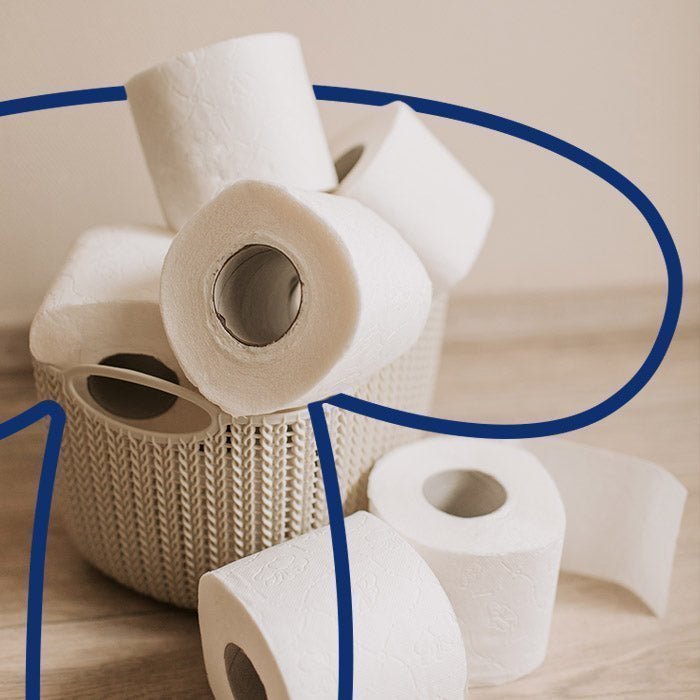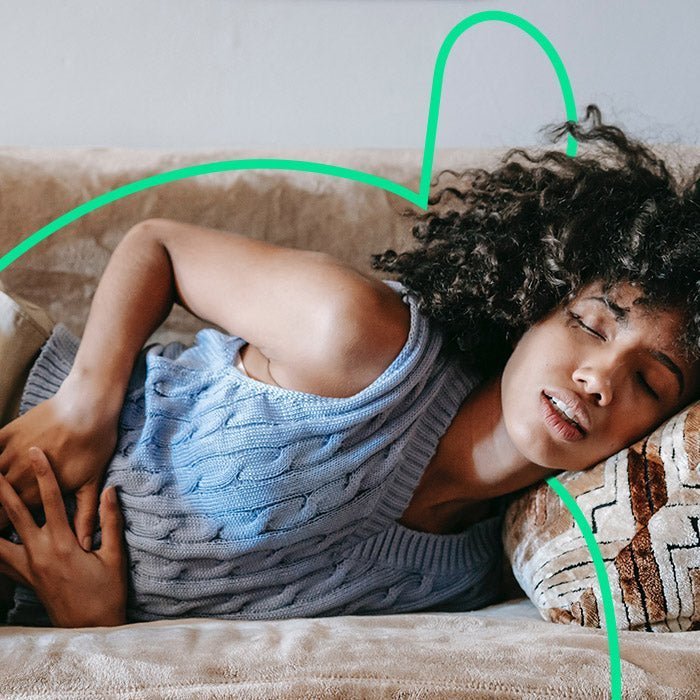Diarrhoea after eating is the presence of frequent, loose, and watery bowel movements that occur shortly after consuming food. Diarrhoea is not just associated with symptoms of loose or watery stools, instead other symptoms may include abdominal pain, bloating, stomach-ache and needing to use the toilet frequently.
Diarrhoea after eating is called Postprandial Diarrhoea, and it is classified as either acute or chronic. Acute diarrhoea is symptoms of diarrhoea that lasts for a couple of days at most, chronic diarrhoea lasts for at least 4 weeks.
What causes diarrhoea after eating?
Diarrhoea can have a number of causes, from food poisoning and intolerance to viral infections and medication. Depending on whether it is acute or chronic, the causes of diarrhoea can vary as detailed below:
Acute Diarrhoea common causes:
Viral infection
A viral infection such as a temporary stomach bug can cause sudden and unexpected diarrhoea. With a viral infection it is likely that other symptoms may present themselves such as sickness and vomiting. Whilst only temporary, a viral infection can make you particularly sensitive after eating food, and you may experience a sudden urge to go to the toilet soon after eating.
Parasitic infections
Parasitic infections in the gastrointestinal tract caused by common parasites such as Giardia lamblia (giardiasis), Entamoeba histolytica (amoebiasis), and Cryptosporidium, and Cyclospora are known to frequently result in diarrhoea.
The only way to identify/diagnose a gut parasite is by testing. A gut parasite stool test detects the parasite’s DNA in a stool sample and is highly accurate.
Food Intolerances
Food intolerances, in particular lactose intolerance or fructose malabsorption, can trigger diarrhoea after consuming certain foods. These intolerances occur when the body has difficulty digesting specific substances, leading to gastrointestinal symptoms. Trying to identify your food intolerances and removing them from your diet can ensure that you avoid eating any foods that trigger your symptoms, thus reducing the likelihood of experiencing diarrhoea after eating.
Learn more about what a food intolerance is, its causes, triggers, symptoms, and treatment.
Medications
Some medications, such as antibiotics or laxatives, can disrupt the normal digestive process and lead to diarrhoea after eating. We recommend reading the common symptoms located within the patient information leaflet if you are taking any existing or new medicine. If diarrhoea is a known symptom, it will be listed within the common side effects. Medicines that are known to cause diarrhoea include:
- Antibiotics
- Laxatives
- NSAIDs (nonsteroidal anti-inflammatory drugs)
- Proton pump inhibitors (used to treat acid reflux)
Gut dysbiosis
Gut dysbiosis is an imbalance of microorganisms within the gut. It can cause many digestive symptoms, with diarrhoea being one of them. Gut dysbiosis can significantly impact your health if it is not addressed and rectified, it can lead to increased gut permeability, also known as Leaky Gut which can increase your risk of conditions like IBS, and increases your risk of other chronic conditions. A healthy gut microbiome will help the body to effectively digest foods, meaning digestive symptoms such as diarrhoea and bloating are less troublesome.
A gut-microbiome test for diarrhoea won’t diagnose the root cause of your diarrhoea, but it can spotlight diarrhoea-linked bacteria, parasites or a lack of fibre-friendly bugs particularly if you are experiencing chronic diarrhoea.
Chronic Diarrhoea common causes:
IBS (irritable bowel syndrome) is a common condition that affects the digestive system, it causes symptoms like bloating, stomach ache, diarrhoea and constipation. It is a lifelong condition, however symptoms tend to come and go and can typically last weeks and months at a time.
IBD (Irritable bowel disease) shares many similar symptoms to IBS, it causes inflammation of the bowel as a result of the immune system attacking health cells in the intestine. IBD is largely genetically linked, meaning you are more likely to get it if a close relative such as a grandparent or parent also has it.
Coeliac disease is an autoimmune condition that affects the absorption of Gluten and damages the intestine whenever Gluten is consumed. Individuals with Coeliac disease will experience diarrhoea and other symptoms when they eat food that contains gluten.
What foods cause diarrhoea?
Some of the most common foods and ingredients that cause diarrhoea after eating include:
- Spicy/hot foods
- Alcohol
- Greasy foods
- Caffeine and foods that contain caffeine
- Fructose (a natural sugar found in fruit)
- Fast food
- Vegetables such as broccoli, cauliflower and onions
- Garlic
Whilst everyone will react differently to foods, the foods are among the most common culprits of food induced diarrhoea.
How quickly can you get diarrhoea after eating?
The timing of diarrhoea after eating can depend on what has triggered your symptoms. For acute diarrhoea, symptoms can appear quite suddenly. For example, food poisoning can trigger diarrhoea in just 30 minutes after coming into contact with the contaminated food. In general, symptoms may manifest within a few minutes to a couple of hours after consuming a meal.
How is it treated?
Managing and treating diarrhoea after eating involves several approaches. In many cases, lifestyle changes and dietary modifications can play a crucial role. Identifying and eliminating trigger foods from your diet can help alleviate symptoms. If diarrhoea persists or becomes chronic, it's important to seek medical advice to determine the underlying cause and explore appropriate treatment options.
For acute diarrhoea, treatment is not usually needed as the symptoms of diarrhoea will typically clear after a couple of days.
Simple techniques to help treat diarrhoea
- Dietary changes - Try adding more fibre or incorporating more gut friendly foods into your diet.
- Probiotics and prebiotics - Probiotics and prebiotics help to improve your overall gut health, with certain probiotics such as Saccharomyces boulardii helping to improve symptoms of diarrhoea. Always seek the advice of a registered dietitian when adding probiotics or prebiotics into your diet.
Our guide explains the difference between probiotics and prebiotics and how they can help diarrhoea.
Could diarrhoea be a sign of IBS?
Diarrhoea can indeed be a sign of irritable bowel syndrome (IBS). IBS is a common gastrointestinal disorder that affects the functioning of the intestines, causing symptoms such as abdominal pain, bloating, and changes in bowel habits. Diarrhoea-predominant IBS (IBS-D) specifically involves frequent episodes of loose stools. It is important to look out for other symptoms that are closely related to IBS as diarrhoea alone is not enough to assume that your symptoms are a sign of IBS.
Whilst there is no specific test that can diagnose IBS, it is typically diagnosed by ruling out other conditions and causes of your diarrhoea. A gut microbiome test kit can identify whether you are at risk of developing IBS by measuring the type and balance of microbiota within the gut.
Can it lead to any complications?
While most cases of diarrhoea after eating are usually harmless, there can be some risks associated with persistent or chronic diarrhoea. The main risk includes dehydration, electrolyte imbalances, malnutrition, and impaired quality of life. Staying hydrated can ensure the risk and symptoms of dehydration is reduced.
Dehydration can also lead to feeling tired after eating, which is a common symptom of a food intolerance.
How can I prevent diarrhoea?
The most effective way to reduce the likelihood of diarrhoea is trying to identify and remove your trigger foods by implementing an elimination diet. A food intolerance test can help you to identify your problem foods. Other measures involve practicing proper food hygiene and preparation including thoroughly washing hands before handling foods, managing stress levels, and maintaining a balanced and nutritious diet.
Can stress and anxiety cause diarrhoea?
Stress and anxiety can have a significant impact on digestive health with research showing that stress can cause intestinal cramping which can lead to diarrhoea. The gut-brain connection plays a crucial role in gastrointestinal function, and heightened stress levels can disrupt normal digestion.
When should I see a doctor?
While occasional episodes of diarrhoea after eating can be normal and quite common, however if you experience any of the below you should contact your GP:
- Chronic diarrhoea that lasts for longer than 3 days
- Severe abdominal pain, bloating or stomach cramps
- Blood in the stool
- Weight loss or dehydration
- Symptoms that significantly your day-to-day life




